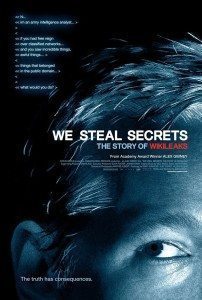
By Andrew Veihmeyer
In a digital world where exposing sensitive details is often commonplace and instant, what happens when decades worth of data is revealed in one of the largest breaches of government information in history? What are the ethical standards expected of the individuals who reveal it?
These questions and more are examined in the Alex Gibney documentary We Steal Secrets: The Story of WikiLeaks, which plays Aug. 9 at the historic Tower Theatre (815 E. Olive Ave.). The film is hosted by Fresno Filmworks, the nonprofit that brings independent and international movies to the Central Valley each month.
The screening of We Steal Secrets arrives during an important time in the ongoing narrative regarding national security issues, amid dramatic new revelations about the government’s use of data.
“The U.S. government, no matter the administration, always walks a fine line when using its power to suppress information,” says Jefferson Beavers, the communication director for Filmworks. Beavers, who teaches journalism at Fresno City College, hopes those who attend consider the imposed limits to freedom of expression depicted in the film.
The government’s steps to secure the leaked data and detain informants, along with the public response to the current administration’s handling of the latest leaks, often escape the public’s eye, but that doesn’t seem to phase WikiLeaks founder Julian Assange. In a recent ABC interview with George Stephanopoulos, Assange stated that WikiLeaks would continue posting future government documents and has no intention of admitting to any wrongdoing.
The ABC story focused on Edward Snowden, a former NSA (National Security Agency) and CIA (Central Intelligence Agency) employee who leaked new government files earlier this year. Snowden is currently stuck in Russia, seeking asylum there or in Latin America. During the interview, a taped segment was shown of U.S. Secretary of State John Kerry criticizing Snowden and predicting, with the latest data leaks, a higher level of sophistication in future terrorist attacks and even death for compromised Americans worldwide.
Assange, currently in a safe house in Ecuador, downplayed Kerry’s comments to Snowden as skilled rhetoric, nothing more.
“Not a single U.S. government official, no one from the Pentagon, no one from any government has sensed that any of our revelations in the past six years has caused anyone to come to physical harm,” Assange told ABC.
While much of the current media attention is on Snowden, We Steal Secrets focuses on the earlier revelations of Bradley Manning, a U.S. Army soldier taken into custody in May 2010 for leaking video footage of U.S. forces in a Baghdad airstrike, hundreds of thousands of Army reports from Iraq and Afghanistan, and diplomatic cables dating back to 1966. The documents were published online via WikiLeaks and Assange’s global network of digital activists.
Manning’s current military trial continues, and he faces a possible sentence of life in prison.
In an article by The Telegraph that compares Manning and Snowden, the newspaper argues that there are distinct parallels in their stories but there remains “a crucial distinction.” Manning could not have been aware of the sheer mass of everything he transmitted, says an unidentified former defense official, whereas Snowden’s release of classified data from surveillance programs in both the United States and Britain, so far, seems more deliberate, selective and targeted.
The alleged recklessness of Manning, experts say, may be particularly troublesome considering the amount of information he had access to. In any case where classified or private information becomes publicly accessible, the individuals involved must exercise careful judgment.
“They have to take responsibility of the consequences of disclosure,” says Robert Navarro, a Fresno lawyer who is affiliated with the Greater Fresno Chapter of the ACLU. Navarro, who also serves as Fresno Filmworks’ vice president, says the goal for anyone who discloses sensitive information ought to be about “informing the public without putting undue risk to the health and safety of the person who might be involved in the activity.”
At the screening, Navarro and the ACLU will conduct an informal survey for the audience to provide feedback on free speech and information issues facing those in Fresno County. He hopes it will help the local ACLU chapter to direct its attention to specific matters facing the area.
Joining the ACLU Greater Fresno Chapter as sponsors of the Aug. 9 film are the WILPF Fresno Branch and the Community Alliance newspaper. Show times are 5:30 p.m. and 8:30 p.m.
*****
Andrew Veihmeyer serves as the media relations and communication intern for Fresno Filmworks. Contact him at aveihmeyer@gmail.com.
